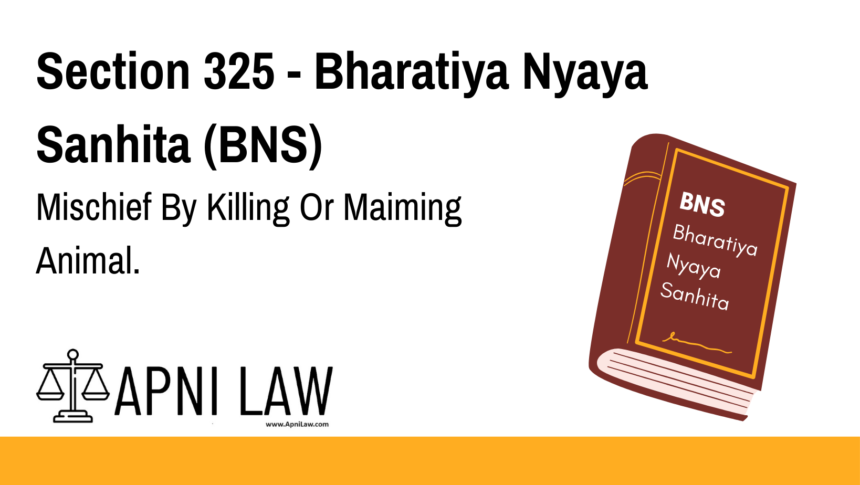Code: Section 325 BNS
Whoever commits mischief by killing, poisoning, maiming or rendering useless
any animal shall be punished with imprisonment of either description for a term which may
extend to five years, or with fine, or with both.
Explanation of Section 325 BNS
Section 325 of the Bharatiya Nyaya Sanhita (BNS) specifically addresses acts of mischief involving animals. This provision recognizes the importance of animal welfare and aims to prevent cruelty and harm towards animals, which can have both ethical and legal implications.
Key Elements of the Offense:
- Acts Covered:
- Killing an animal intentionally.
- Poisoning an animal, causing harm or death.
- Maiming an animal, causing permanent injury or disability.
- Rendering useless an animal, impairing its ability to perform its functions (e.g., work animals).
- Intent or Knowledge:
- The act must be committed with an intention to cause harm or with knowledge that the act is likely to cause harm to the animal.
- Punishment:
- Imprisonment of up to 5 years, or
- Fine, or
- Both.
Illustrations
Example 1: Poisoning a Stray Dog
A poisons a stray dog in the neighborhood, intending to eliminate it as a nuisance. This act would qualify as mischief under Section 325.
Example 2: Injuring a Work Animal
A deliberately injures a bull used for farming, causing permanent lameness. This could be prosecuted under Section 325 for maiming an animal.
Example 3: Killing Pet Animals for Fun
A individual kills a neighbor’s pet bird out of malice or for fun. This would be considered an offense under Section 325.
Example 4: Rendering Livestock Useless
A person intentionally harms a cow, causing it to be unable to produce milk, thereby reducing its utility. This act falls within the ambit of this section.
Common Questions and Answers on Section 325 BNS
1. What acts are considered mischief under Section 325?
- Answer: Killing, poisoning, maiming, or rendering useless any animal intentionally or negligently.
2. Does this apply to all animals?
- Answer: Yes, the section applies to all animals, whether domestic, wild, or farm animals.
3. Can a person be punished if the animal was harmed accidentally?
- Answer: The offense requires intent or knowledge of likely harm. Accidental harm without intent may not qualify unless there was gross negligence.
4. Are there any exceptions to this section?
- Answer: Yes, acts done in good faith for religious rituals, scientific research, or veterinary purposes may not constitute an offense if they don’t cause unnecessary harm.
5. How does this section differ from animal cruelty laws?
- Answer: While Section 325 focuses on mischief causing harm to animals, animal cruelty laws (like the Prevention of Cruelty to Animals Act) address broader issues of abuse and neglect.
Conclusion
Section 325 BNS is crucial for protecting animal rights under the legal framework. By penalizing acts that cause harm or disable animals, it promotes ethical treatment and accountability. The section also complements other laws related to animal welfare.











